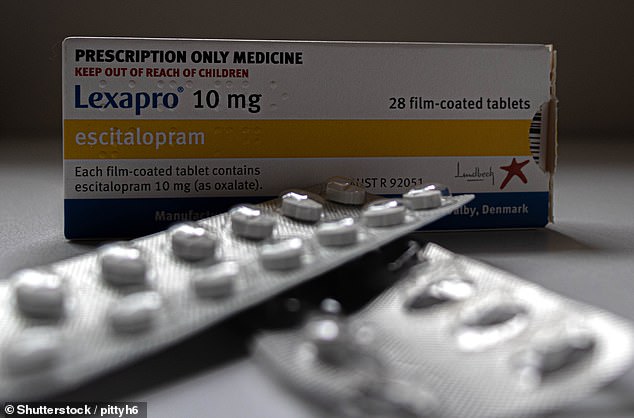It’s a drug that one in seven Australians take every day, but it has horrific side effects that no one wants to talk about. Now the pharmacist is finally taking action – but for many it is too late
Pharma companies will have to slap warnings on antidepressants that warn patients that the drug can cause long-term sexual dysfunction.
The Therapeutic Goods Administration (TGA) will note that sexual dysfunction for those taking selective serotonin reuptake inhibitor (SSRI) drugs can last months – or even years – after the patient stops taking the drug.
TGA so far has 89 reports of sexual dysfunction during the use of SSRI or SNRI (serotonin and norepinephrine reuptake inhibitor) in its database of adverse events.
It also reported four reports of persistent sexual dysfunction after users – three men and one woman – stopped using the medication.
However, the agency believes that post-SSRI sexual dysfunction (PSSD) is under-reported in Australia due to the large number of cases reported in Europe.
These reports detail symptoms such as erectile dysfunction, erectile dysfunction, erectile dysfunction and erectile dysfunction, reports The Australian.

Drug companies will be asked to list long-term sexual dysfunction as a possible symptom in Australians taking antidepressants (stock image)

Lexapro is one of the many SSRI antidepressants available for purchase nationwide
‘The effects lasted for 12 months to three and a half years. “Sexual dysfunction after stopping treatment is thought to be rare,” said the TGA.
However, these symptoms may not be fully localized and their prevalence is currently unknown.
‘Healthcare professionals should be aware of this issue and consider whether current or past antidepressant use may be a factor in patients reporting sexual dysfunction… and report if they suspect the organization.’
As a result, all SSRI and SNRI medications must carry a warning that the pills can cause sexual dysfunction.
The label must also advise that some users have experienced long-term sexual problems after stopping the medication.
Several drug manufacturers in Australia have begun to include the potential risk of sexual dysfunction on SSRI drug labels.
It is estimated that one in seven Australians take antidepressants every day, and more than 32 million prescriptions are now issued for the medication each year.

It is estimated that one in seven Australians take antidepressants every day with more than 32 million prescriptions for the drug dispensed each year (stock image)
It comes after the Food and Drug Administration (FDA) in the United States was hit with a lawsuit due to what was considered a failure to mandate updated labels.
Tens of thousands of PSSD sufferers lament their long-term symptoms on online forums – with many fearing that sexual dysfunction is lifelong.
Australian consultant neurologist Julia Thompson said the reason why sexual dysfunction is delayed after the use of SSRIs is not known.
“There is an indication now that there is reason to pay attention to it, but it must be emphasized that the mechanisms are not understood,” he said.
‘The exact reason why sexual dysfunction may last so long is not fully understood. Now we are trying to understand the pathogenesis. This is a difficult area when it comes to sex.
‘I think it’s important that we don’t say that drugs are the cause because people can become black because of abuse or other things. The confusing thing is that those symptoms are also symptoms of depression and symptoms of chronic pain.’

All SSRI and SNRI medications must carry a warning that antidepressants can cause sexual dysfunction that can last months or years (stock photo)
A study by the University of New South Wales in 2023 found that more than three million Australians take antidepressants each year.
On a personal basis, this puts Australia behind only Iceland – where Seasonal Affective Disorder is common due to the 19-hour winter nights – and the US.
The study found that prescription rates doubled in the last 10 years when the start of Covid Lockdowns increased by 15 percent.
The study found that Covid caused an increase in the use of antidepressants “which was greater among women than men, and greater among young women than other groups”.
This suggested an ‘increasing mental health burden in a population already at risk of increased use of antidepressants prior to this epidemic’.
Guidelines usually recommend antidepressants be taken for six to 12 months after a relapse but this can extend to two years for people at risk of relapse.
The average length of time Australians take antidepressants is now four years.
#drug #Australians #day #horrific #side #effects #talk #pharmacist #finally #action #late